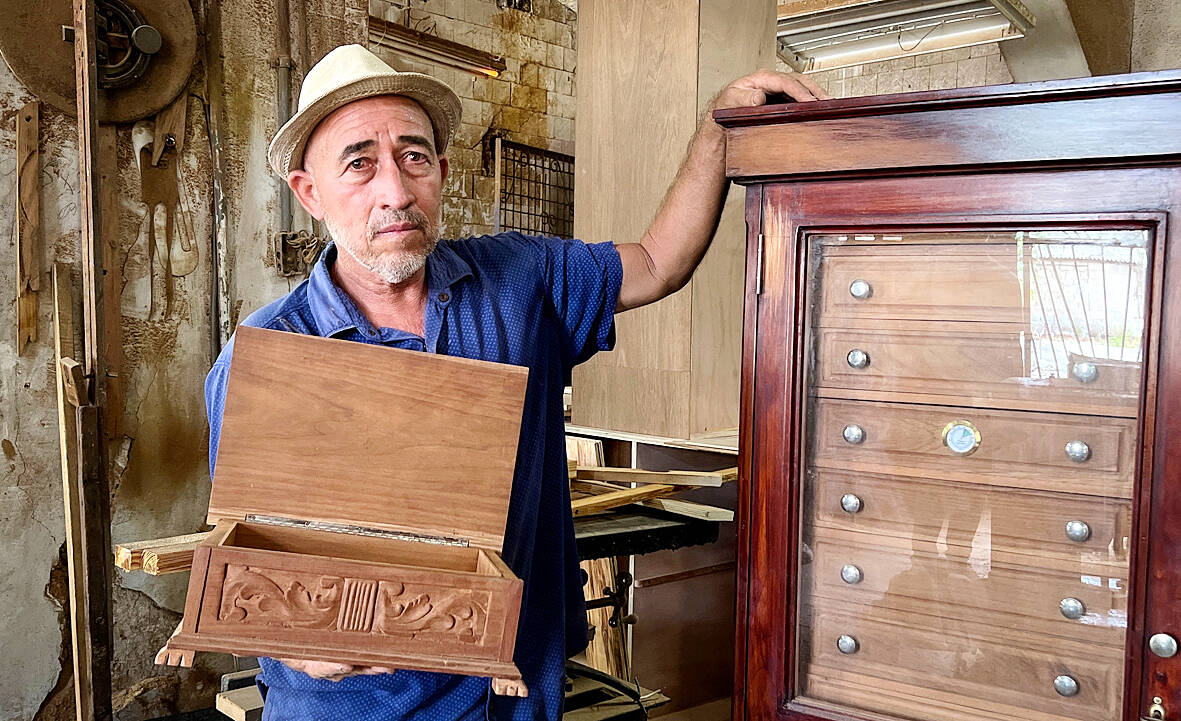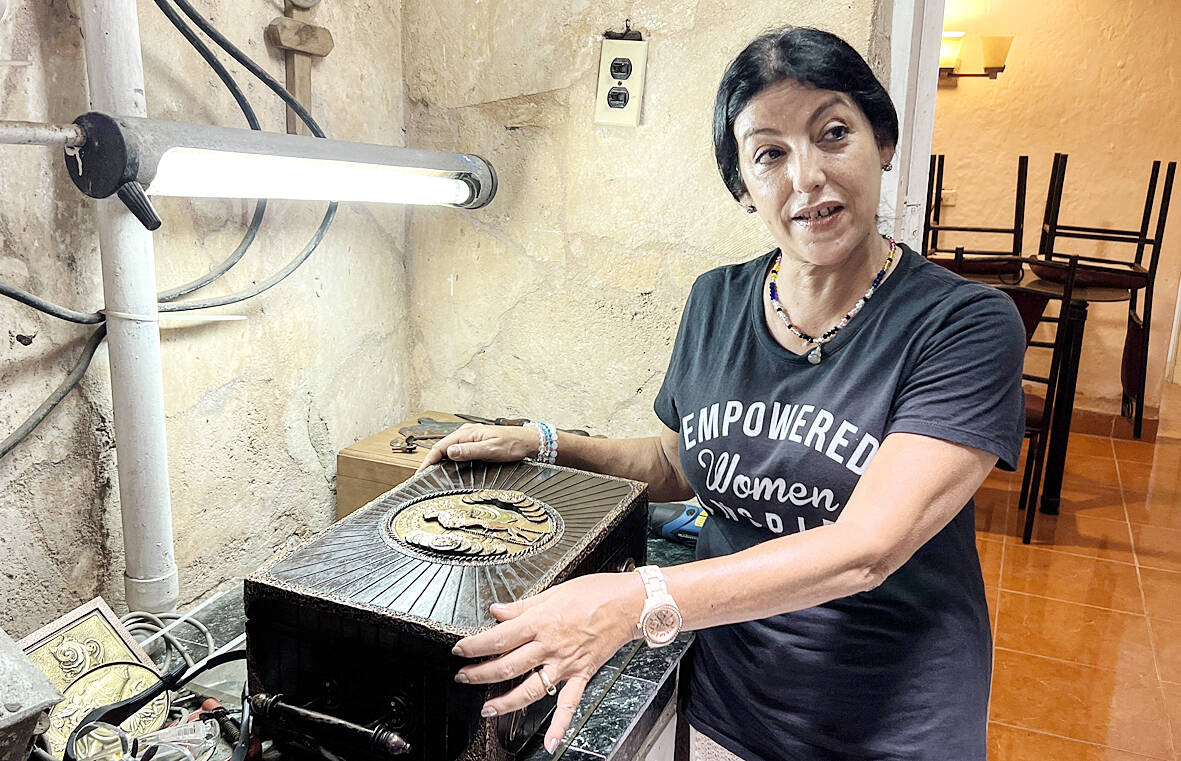Using a Soviet-era planer, Rene Reyes smooths the panel of an old cedar door that he will transform into a humidor — an ornate, handmade box used to preserve Cuba’s famous cigars. In a corner of the workshop lies a hodge-podge of discarded wooden beams, doors and furniture, all used to make the cigar boxes, which can sell for thousands of dollars and are prized by wealthy business people, rock stars and presidents.
“People don’t believe that ... these humidors come from there,” says Reyes, pointing to the pile of raw materials.
The artisan is working on the replica of a modest humidor owned by American writer Ernest Hemingway, the original of which is displayed at his former home in eastern Havana, which is now a museum.

Photo: AFP
As he brushes the door panel, which he says is over 80 years old, the warm and sweet aroma of old cedar fills the workshop.
“The smell of cedar is the best. It is as if it were gold, old gold,” Reyes gushes as he brings his hands full of sawdust to his nose.
Reyes works for businesswoman Tania Duyos, who has spent two decades designing the boxes that keep cigars at the perfect humidity of around 65 or 70 percent and a temperature of 16 to 18 degrees Celsius.

Photo: AFP
She boasts celebrity clients such as former US president Jimmy Carter, the late footballer Diego Maradona, and Rolling Stones frontman Mick Jagger.
Duyos says she also gifted one of her cigar boxes to another former US president, Barack Obama, during his historic 2016 visit to the island, and that he wrote her a thank you letter.
Cuban cigars are one of the island’s most famous exports and are considered among the finest in the world. Dozens of humidor workshops can be found across the country. Experts say a good humidor can preserve the quality of a cigar for up to 15 years, and even improve it.
Cuban artisans use several types of wood, such as mahogany or ebony, but tradition dictates that the interior must be made from old cedar.
“Cedar is very favorable” because “it protects the tobacco from bacteria and provides it with the humidity,” necessary for its conservation, Duyos says. If kept in the wrong environment, even the best cigar loses its quality.
With carved, embossed or painted designs, some of the chests are true works of art and are coveted by collectors.
While some are sold for eye-watering prices, more modest versions are also available on the local market.
Every year, the Habano Festival — dedicated to cigar enthusiasts — closes with a humidor auction.
In February, the auction of six cigar boxes raised a record US$11.9 million. The star of the show was an exquisite, circular piece, one meter deep, made of precious woods, with titanium and bronze touches.
Containing 500 of the best Cohiba cigars — the most prestigious from the island — it sold for US$4.4 million.
Duyos admits that in Cuba, which has been under American sanctions for over half a century and gripped by the worst economic crisis in 30 years, you need to adapt to shortages of glue, sealants, varnish, sandpaper or tools.
“We practically work wonders with nothing,” said Reyes. “The secret is the love” of the job.

In the March 9 edition of the Taipei Times a piece by Ninon Godefroy ran with the headine “The quiet, gentle rhythm of Taiwan.” It started with the line “Taiwan is a small, humble place. There is no Eiffel Tower, no pyramids — no singular attraction that draws the world’s attention.” I laughed out loud at that. This was out of no disrespect for the author or the piece, which made some interesting analogies and good points about how both Din Tai Fung’s and Taiwan Semiconductor Manufacturing Co’s (TSMC, 台積電) meticulous attention to detail and quality are not quite up to

April 21 to April 27 Hsieh Er’s (謝娥) political fortunes were rising fast after she got out of jail and joined the Chinese Nationalist Party (KMT) in December 1945. Not only did she hold key positions in various committees, she was elected the only woman on the Taipei City Council and headed to Nanjing in 1946 as the sole Taiwanese female representative to the National Constituent Assembly. With the support of first lady Soong May-ling (宋美齡), she started the Taipei Women’s Association and Taiwan Provincial Women’s Association, where she

It is one of the more remarkable facts of Taiwan history that it was never occupied or claimed by any of the numerous kingdoms of southern China — Han or otherwise — that lay just across the water from it. None of their brilliant ministers ever discovered that Taiwan was a “core interest” of the state whose annexation was “inevitable.” As Paul Kua notes in an excellent monograph laying out how the Portuguese gave Taiwan the name “Formosa,” the first Europeans to express an interest in occupying Taiwan were the Spanish. Tonio Andrade in his seminal work, How Taiwan Became Chinese,

Mongolian influencer Anudari Daarya looks effortlessly glamorous and carefree in her social media posts — but the classically trained pianist’s road to acceptance as a transgender artist has been anything but easy. She is one of a growing number of Mongolian LGBTQ youth challenging stereotypes and fighting for acceptance through media representation in the socially conservative country. LGBTQ Mongolians often hide their identities from their employers and colleagues for fear of discrimination, with a survey by the non-profit LGBT Centre Mongolia showing that only 20 percent of people felt comfortable coming out at work. Daarya, 25, said she has faced discrimination since she